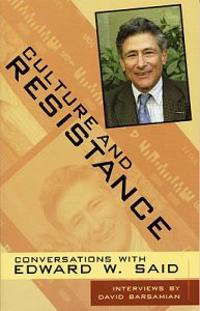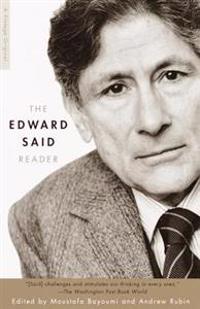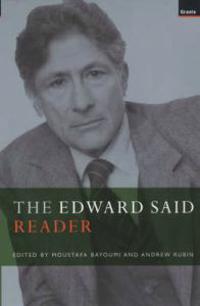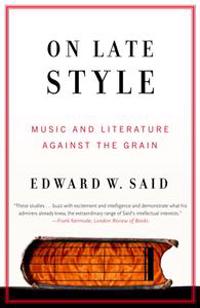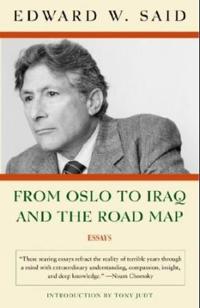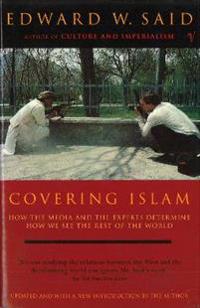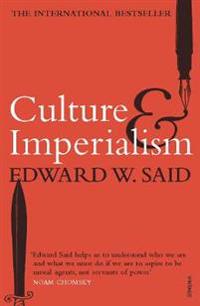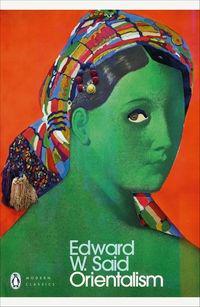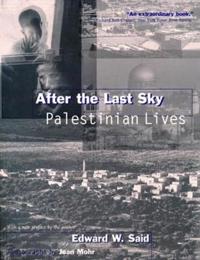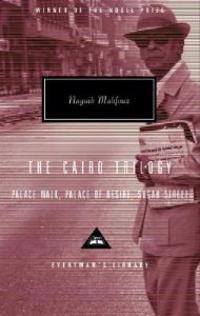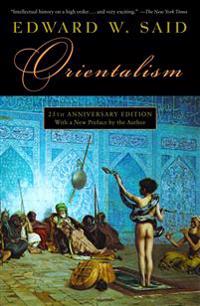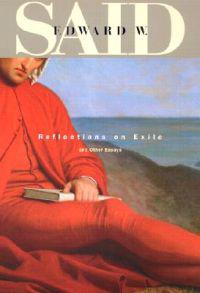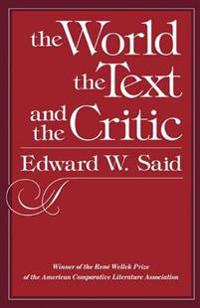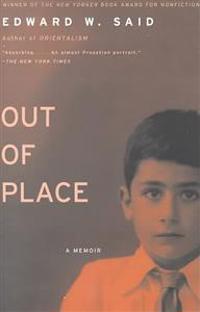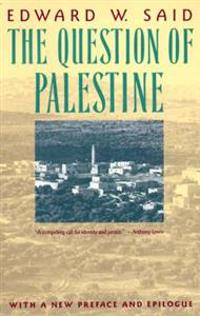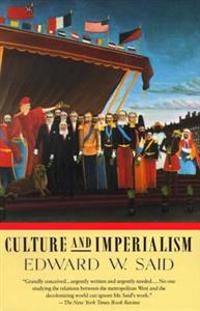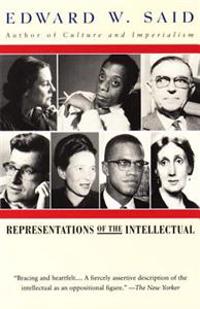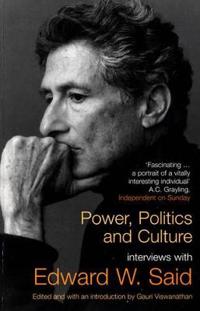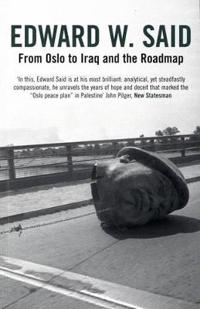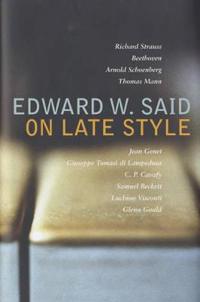Culture and Resistance: Conversations with Edward W. Said (Häftad)
avDavid Barsamian, Edward W. Said
ISBN: 9780896086708 - UTGIVEN: 2008-11In his latest book of interviews, Edward W. Said discusses the centrality of popular resistance to his understanding of culture, history, and social change. He reveals his latest thoughts on the war on terrorism, the war in Afghanistan, and the Israeli-Palestinian conflict, and lays out a compelling[...]
The Edward Said Reader (Häftad)
avMoustafa Bayoumi, Andrew Rubin, Edward W. Said
ISBN: 9780375709364 - UTGIVEN: 200009Edward Said, the renowned literary and cultural critic and passionately engaged intellectual, is one of our era's most formidable, provocative, and important thinkers. For more than three decades his books, which include Culture and Imperialism, Peace and Its Discontents, and the seminal study Orie[...]
Edward Said Reader (Häftad)
avEdward W. Said
ISBN: 9781862074453 - UTGIVEN: 2001-10A selecton of key pieces from Said's works, including his groundbreaking 1966 study of Joseph Conrad, through to "Culture and Imperialism", to the recently critically acclaimed memoir "Out of Place".[...]
Freud and the Non-European (Pocket)
avSaid, Edward W
ISBN: 9781844675111 - UTGIVEN: 2004-07-22Using an impressive array of material from literature, archaeology and social theory, Edward Said explores the profound implications of Freuds Moses and Monotheism for Middle-East politics today. The resulting book reveals Said's abiding interest in Freud's work and its important influence on his ow[...]
On Late Style: Music and Literature Against the Grain (Häftad)
avEdward W. Said, Mariam C. Said, Michael Wood
ISBN: 9780375726330 - UTGIVEN: 2007-04A collection of essays by the late cultural critic explores great works of music and literature produced by Beethoven, Schoenberg, Mann, Cavafy, Beckett, Gould, Straus, Genet, and others at the end of their creative lives, analyzing how these works differed from previous ones and what they reveal ab[...]
From Oslo to Iraq and the Road Map: Essays (Häftad)
avEdward W. Said, Tony Judt, Wadie E. Said
ISBN: 9781400076710 - UTGIVEN: 200508In his final book, completed just before his death, Edward W. Said offers impassioned pleas for the beleaguered Palestinian cause from one of its most eloquent spokesmen. These essays, which originally appeared in Cairo's "Al-Ahram Weekly, London's "Al-Hayat, and the" London Review of Books, take us[...]
Covering Islam (Storpocket)
avEdward W. Said
ISBN: 9780099595014 - UTGIVEN: 199708From the Iranian hostage crisis through the Gulf War and the World Trade Centre bombing, the West has been haunted by a spectre called 'Islam'. As portrayed by the news media - and by a chorus of government, academic and corporate experts - 'Islam' is synonymous with terrorism and religious hysteria[...]
Culture and Imperialism (Storpocket)
avEdward W. Said
ISBN: 9780099967507 - UTGIVEN: 199801From Jane Austen to Salman Rushdie, and from Yeats to the news coverage of the Gulf War, this is broad account of the roots of imperialism in European culture, and an analysis of the impact of 19th-century British and French imperialism on the culture of the period.[...]
Orientalism (Storpocket)
avEdward W. Said
ISBN: 9780141187426 - UTGIVEN: 200308For generations now, Edward W. Said's "Orientalism" has defined our understanding of colonialism and empire, and this "Penguin Modern Classics" edition contains a preface written by Said shortly before his death in 2003. In this highly-acclaimed work, Edward Said surveys the history and nature of We[...]
Beginnings: Intention and Method (Övrig)
avEdward W. Said
ISBN: 9780231059374 - UTGIVEN: 1985-03-13A "beginning," especially as embodied in much modern thought, is its own method, Edward Said argues in this classic treatise on the role of the intellectual and the goal of criticism. Distinguishing between "origin," which is divine, mythical, and privileged, and "beginning," which is secular and hu[...]
Musical Elaborations (Övrig)
avEdward W. Said
ISBN: 9780231073196 - UTGIVEN: 1993-10-21Filling a significant gap in contemporary cultural studies, Musical Elaborations examines the intersection of the public and private meaning of music. Incorporating the music criticism of Adorno, musical ideas from literary works by Proust, and criticism by Benjamin and de Man into his work, noted [...]
After the Last Sky (Häftad)
avEdward W. Said
ISBN: 9780231114493 - UTGIVEN: 199906This book offers a searing portrait of Palestinian life and identity that is at once an exploration of Edward Said's unclaimable past and a testimony to the lives of those living in exile.[...]
Joseph Conrad and the Fiction of Autobiography (Övrig)
avEdward W. Said
ISBN: 9780231140058 - UTGIVEN: 2007-08-01Edward W. Said locates Joseph Conrad's fear of personal disintegration in his constant re-narration of the past. Using the author's personal letters as a guide to understanding his fiction, Said draws an important parallel between Conrad's view of his own life and the manner and form of his stories.[...]
The Cairo Trilogy: Palace Walk, Palace of Desire, Sugar Street (Inbunden)
avNaguib Mahfouz, Edward W. Said
ISBN: 9780375413315 - UTGIVEN: 200110Orientalism (Pocket)
avEdward W. Said
ISBN: 9780394740676 - UTGIVEN: 197910The noted critic and a Palestinian now teaching at Columbia University, examines the way in which the West observes the Arabs[...]
Reflections on Exile and Other Essays (Häftad)
avEdward W. Said
ISBN: 9780674009974 - UTGIVEN: 200211With their powerful blend of political and aesthetic concerns, Edward W. Said's writings have transformed the field of literary studies. This long-awaited collection of literary and cultural essays, the first since Harvard University Press published "The World, the Text, and the Critic" in 1983, rec[...]
The World, the Text, and the Critic (Häftad)
avEdward W. Said
ISBN: 9780674961876 - UTGIVEN: 1984-09Argues that contemporary critics force works of literature to fit their theories and examines the impact of Marxism, linguistics, psychoanalysis, and structuralism on literary criticism[...]
Out of Place: A Memoir (Häftad)
avEdward W. Said
ISBN: 9780679730675 - UTGIVEN: 2000-09From one of the most important intellectuals of our time comes an extraordinary story of exile and a celebration of an irrecoverable past. A fatal medical diagnosis in 1991 convinced Edward Said that he should leave a record of where he was born and spent his childhood, and so with this memoir he re[...]
The Question of Palestine (Inbunden)
avEdward W. Said
ISBN: 9780679739883 - UTGIVEN: 200302Still a basic and indespensible account of the Palestinian question, updated to include the most recent developments in the Middle East- from the intifada to the Gulf war to the historic peace conference in Madrid.[...]
Culture and Imperialism (Häftad)
avEdward W. Said
ISBN: 9780679750543 - UTGIVEN: 199405A landmark work from the intellectually auspicious author of Orientalism that explores the long-overlooked connections between the Western imperial endeavor and the culture that both reflected and reinforced it. "Said is a brilliant . . . scholar, aesthete and political activist."--Washington Post B[...]
Representations of the Intellectual (Häftad)
avEdward W. Said
ISBN: 9780679761273 - UTGIVEN: 199604Power, Politics and Culture (Häftad)
avEdward W. Said
ISBN: 9780747574699 - UTGIVEN: 200503No single book has encompassed the vast scope of Edward Said's erudition quite like Power, Politics and Culture - a collection of his interviews from the last three decades. In these twenty-nine interviews, Said addresses everything from Palestine to Pavarotti, from his nomadic upbringing under colo[...]
From Oslo to Iraq and the Roadmap (Häftad)
avEdward W. Said
ISBN: 9780747576624 - UTGIVEN: 2005-08From Oslo to Iraq and the Roadmap is Edward Said's final collection of essays, written between the end of 2000 and early 2003. They offer Said's commentary on the deepening crisis in the Middle East: pre-September 11 to the bombing of the World Trade Centre, through to the bombing of Afghanistan and[...]
On Late Style (Inbunden)
avEdward W. Said
ISBN: 9780747583653 - UTGIVEN: 2006-05Based on a hugely popular graduate seminar that Said taught in the fall of 1995 at Columbia, On Late Style examines the work produced by Richard Strauss, Ludwig van Beethoven, Arnold Schoenberg, Thomas Mann, Jean Genet, Giuseppe Tomesi di Lampedusa, C.D. Cavafy, Samuel Beckett, Luchino Visconti, and[...]

